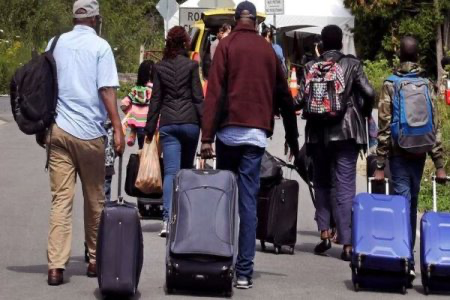The desire to escape Nigeria’s challenges has driven many young Nigerians to seek greener pastures abroad, a phenomenon popularly known as japa.
While emigration has become commonplace, the harsh realities many migrants face in the United States, United Kingdom, and other preferred destinations often contrast sharply with their expectations.
A 2017 Afrobarometer Survey revealed that 35.3% of Nigerians intended to emigrate, while a 2024 study found that the rate among healthcare workers had soared to 80.1%. Popular destinations include the US, UK, and Canada, though some Nigerians also prefer the Middle East and other African countries due to cultural ties.
Despite tightened immigration policies and rising anti-immigrant sentiment in many Western nations, Nigerians remain undeterred. But life in these countries is often more challenging than anticipated.
Researching Migrants’ Realities
A sociologist’s recent study explored the integration and experiences of Nigerian migrants in the US and UK. Drawing from 31 interviews and online comments, the research examined whether the migrants’ pre-migration expectations matched their realities.
The findings revealed a striking disconnect. Many migrants had expected financial success, career advancement, and a better quality of life. Instead, they encountered high living costs, professional setbacks, and cultural isolation.
Employment and Financial Struggles
Before migrating, many Nigerians believed they would quickly achieve financial stability and advance in their professions. However, as one US-based migrant shared:
“We feel everyone in the US is hitting it big. But when I got here, I realized you are paid for your time. It’s not easy—you have to work hard for everything.”
Others found themselves working jobs they would never have considered in Nigeria, such as manual labor or caregiving. High costs of living—including monthly rent, utilities, and even water—added to their struggles.
An Instagram user quipped sarcastically: “One might even pay for the air we breathe here.”
Healthcare Challenges
Access to healthcare was another area where expectations clashed with reality. In the UK, migrants were frustrated by long waiting times for public healthcare, despite it being almost free. In the US, the high cost of medical services left many disillusioned.
One respondent noted that it was easier to see a doctor in Nigeria than in their host country.
Loneliness and Cultural Shock
The vibrant social life many migrants left behind in Nigeria was replaced by a regimented and often isolating lifestyle. Nigerian parties, known as owambe, were sorely missed, and some migrants spent holidays like Christmas alone or at work.
Others struggled with unfriendly neighbors and cultural differences. A UK-based Instagram user recounted being warned by a neighbor: “Tell your kids to keep their voices down, or I’ll alert the police and social services.”
Staying Despite Disappointment
Despite their struggles, most migrants expressed no interest in returning to Nigeria. The challenges of living abroad were outweighed by the predictability and stability of their new environments.
In the west, they enjoy guaranteed rights, timely salaries, and safer living conditions. They don’t fear authoritarian bosses or power outages, and students can plan their academic journeys with certainty.
For many, the failures of governance in Nigeria—such as frequent fuel price hikes and systemic corruption—make returning unthinkable.
Conclusion
While japa remains a popular escape for many Nigerians, this study highlights the importance of realistic expectations. Migration can offer opportunities, but it also comes with significant challenges. Host countries, too, could benefit from better understanding the expectations of migrants to foster smoother integration and mutual understanding.
Culled: theconversation.com
